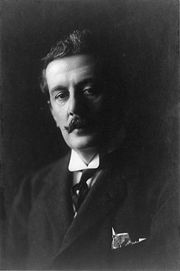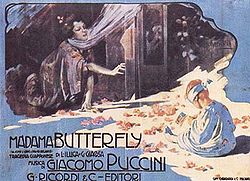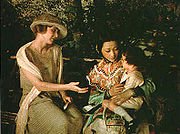
Madama Butterfly
Background Information
SOS Children, which runs nearly 200 sos schools in the developing world, organised this selection. Do you want to know about sponsoring? See www.sponsorachild.org.uk
Madama Butterfly (Madame Butterfly) is an opera in three acts (originally two acts) by Giacomo Puccini, with an Italian libretto by Luigi Illica and Giuseppe Giacosa. The opera was based in part on the short story "Madame Butterfly" (1898) by John Luther Long—which was turned into a play by David Belasco—and also on the novel Madame Chrysanthème (1887) by Pierre Loti.
The two-act version of the opera premiered on February 17, 1904, at La Scala in Milan. It was very poorly received despite the presence of such notable singers as soprano Rosina Storchio, tenor Giovanni Zenatello and baritone Giuseppe De Luca in the lead roles. On May 28 of that year, a revised version was performed in Brescia. The revision split the disproportionately long second act in two and included some other minor changes. In its new form, Puccini's opera was a huge success; it crossed the Atlantic to the Metropolitan Opera in New York in 1907.
The opera is set in the city of Nagasaki and, according to American scholar Arthur Groos, was based on events that actually occurred there in the early 1890s. Japan's best-known opera singer Tamaki Miura won international fame for her performances as Cio-Cio-san and her statue, together with that of Puccini, can be found in Nagasaki's Glover Garden.
Today, the opera is enjoyed in two acts in Italy, while in America the three-act version is more popular. As a staple of the standard operatic repertoire, it appears at Number 1 on Opera America's list of the 20 most-performed operas in North America.
Roles
| Role | Voice type | Premiere Cast, February 17, 1904 (Conductor: Cleofonte Campanini) |
Brescia cast, May 28, 1904 (Conductor: Cleofonte Campanini) |
|---|---|---|---|
| Cio-Cio San (Madam Butterfly) | spinto soprano | Rosina Storchio | Salomea Krusceniski |
| Suzuki, her maid | mezzo-soprano | Giuseppina Giaconia | Giovanna Lucacevska |
| B. F. Pinkerton, Lieutenant in the United States Navy | tenor | Giovanni Zenatello | Giovanni Zenatello |
| Sharpless, United States consul at Nagasaki | baritone | Giuseppe de Luca | Virgilio Bellatti |
| Goro, a matchmaker | tenor | Gaetano Pini-Corsi | Gaetano Pini-Corsi |
| Prince Yamadori | tenor | Emilio Venturini | |
| The Bonze, Cio-Cio San's uncle | bass | Paolo Wulmann | |
| Yakuside, Cio-Cio San's uncle | bass | Antonio Volpini | |
| The Imperial Commissioner | bass | Viale | |
| The Official Registrar | bass | Gennari | |
| Cio-Cio San's mother | mezzo-soprano | Tina Alasia | |
| The aunt | soprano | Ghissoni | |
| The cousin | soprano | Palmira Maggi | |
| Kate Pinkerton | mezzo-soprano | Manfredi | |
| Dolore ('Sorrow'), Cio-Cio San's child | silent | ||
| Cio-Cio San's relations and friends and servants | |||
Synopsis (final version)
Act 1
Lieutenant B.F. Pinkerton, a sailor with the USS Abraham Lincoln in the port of Nagasaki marries Cio-Cio-San ( Japanese: Chōchō-san), or as she is known to her friends, "Butterfly", a 15-year-old Japanese geisha. The Matchmaker Goro has arranged the wedding contract and rented a little hillside house for the newlyweds. The American consul Sharpless, a kind man, begs Pinkerton to forget this plan, when he learns that Butterfly innocently believes the marriage to be binding. (In fact, both the marriage and the lease on the house may be canceled at short notice). The lieutenant laughs at Sharpless' concern, and the bride appears with her friends, joyous and smiling. Sharpless learns that, to show her trust in Pinkerton, she has renounced the faith of her ancestors and, therefore, she can never return to her own people. (Butterfly: "Hear what I would tell you"). Pinkerton also learns that she is the daughter of a disgraced samurai who committed seppuku, and so the little girl was sold to be trained as a geisha. The marriage contract is signed and the guests are drinking a toast to the young couple when the bonze, a Buddhist monk and the uncle of Cio-Cio-San enters, uttering imprecations against her for having adhered to the foreign faith. The bonze's curses induce her friends and relatives to abandon her. Pinkerton, annoyed, hurries the guests off, and they depart in anger. With loving words he consoles the weeping bride, and the two begin their new life happily. (Duet, Pinkerton, Butterfly: "Just like a little squirrel"; Butterfly: "But now, beloved, you are the world"; "Ah! Night of rapture").
Act 2
Three years have passed following the end of Pinkerton's tour of duty and his return to the United States, after promising Butterfly to return "When the robins nest again." Butterfly's faithful servant Suzuki rightly suspects that he has abandoned them, but is upbraided for want of faith by her trusting mistress. (Butterfly: "Weeping? and why?") At this point, Cio-Cio San sings one of the most repeated arias in all of opera "Un Bel Di" (One fine day) to Suzuki, where she describes the day when Pinkerton returns to her on his White Ship. Meanwhile, Sharpless has been sent by Pinkerton with a letter telling Butterfly that he has married an American wife. Butterfly (who cannot read English) is enraptured by the sight of her lover's letter and cannot conceive that it contains anything but an expression of his love. Seeing Butterfly's joy, Sharpless cannot bear to hurt her with the truth. When Goro brings Prince Yamadori, a rich suitor, to meet Butterfly, she refuses to consider his suit, telling them with great offense that she is already married to Pinkerton. Goro explains that a wife abandoned is a wife divorced, but Butterfly declares defiantly, "That may be Japanese custom, but I am now an American woman." Sharpless cannot move her, and at last, as if to settle all doubt, Butterfly, proudly presents her fair-haired child. A stirring brass fanfare accompanies his introduction. "Can my husband forget this?" she challenges. Butterfly explains that the boy's name is "Sorrow," but when his father returns, his name will be "Joy." The consul departs sadly. But Butterfly has long been a subject of gossip, and Suzuki catches the duplicitous Goro spreading more. Just as things cannot seem worse, distant guns salute the new arrival of a man-of-war, the Abraham Lincoln, Pinkerton's ship. Butterfly and Suzuki, in great excitement, deck the house with flowers, and array themselves and the child in gala dress. All three peer through shōji doors to watch for Pinkerton's coming. As night falls, a long orchestral passage with choral humming (the "humming chorus") plays. Suzuki and the child gradually fall asleep - but Butterfly, alert and sleepless, never stirs.
Act 3
It is dawn and Butterfly is still intently watching. Suzuki awakens and brings the baby to her. (Butterfly: "Sweet, thou art sleeping.") Suzuki persuades the exhausted Butterfly to rest. Pinkerton and Sharpless arrive and tell Suzuki the terrible truth: Pinkerton has abandoned Butterfly for an American wife named Kate. The lieutenant is stricken with guilt and shame (Pinkerton: "Oh, the bitter fragrance of these flowers!"), but is too much of a coward to tell Butterfly himself. Suzuki, at first violently angry, is finally persuaded to listen as Sharpless assures her that Mrs. Pinkerton will care for the child if Butterfly will give him up. Pinkerton departs. Suzuki brings Butterfly into the room. She is radiant, expecting to find her husband, but is confronted instead by Pinkerton's new wife. As Sharpless watches silently, Kate begs Butterfly's forgiveness and promises to care for her child if she will surrender him to Pinkerton. Butterfly receives the truth with apathetic calmness, politely congratulates her replacement, and asks Kate to tell her husband that he must come in half an hour, and then he may have Sorrow, whose name will then be changed to Joy. She herself will "find peace." She bows her visitors out, and is left alone with young Sorrow. She bids a pathetic farewell to her child (Finale, Butterfly: "You, O beloved idol!"), blindfolds him, and puts a doll and a small American flag in his hands. She takes her father's dagger--the weapon with which he committed suicide--and reads its inscription: "To die with honour, when one can no longer live with honour." She takes the sword and a white scarf behind a screen, and emerges a moment later with the scarf wrapped round her throat. She embraces her child for the last time and sinks to the floor. Pinkerton and Sharpless rush in and discover the dying girl. The lieutenant cries out Butterfly's name in anguish as the curtain falls.
Noted arias
- "Dovunque al mondo" - Benjamin Pinkerton in Act I
- "Quanto cielo! Quanto mar!" – Madama Butterfly in Act I
- "Viene la sera" – Madama Butterfly & Benjamin Pinkerton in Act I
- "Vogliatemi bene" (Love me) - Madama Butterfly in Act I
- "Un bel dì vedremo" (One fine day we shall see) - Madama Butterfly in Act II
- "Addio, fiorito asil" (Adieu, flowered refuge) - Benjamin Pinkerton in Act III
- "Tu, tu piccolo Iddio" - Madama Butterfly in Act III
- "Con onor muore" - Madama Butterfly in Act III
Selected recordings
| Year | Cast (Cio-Cio San, B.F. Pinkerton, Suzuki, Sharpless) |
Conductor, Opera House and Orchestra |
Label |
|---|---|---|---|
| 1939 | Toti dal Monte, Beniamino Gigli, Vittoria Palombini, Mario Basiola |
Oliviero de Fabritiis, Rome Opera Chorus and Orchestra |
Audio CD: Naxos Historical Cat:8110183-84 |
| 1948 | Eleanor Steber, Jan Peerce, Suzanne Carre, Richard Bonelli |
Eugene Ormandy, Hollywood Bowl Orchestra and Chorus |
CD: Line Music Cat: 5.00962 |
| 1954 | Maria Callas, Nicolai Gedda, Lucia Danieli, Mario Borriello |
Herbert von Karajan, La Scala Orchestra and Chorus |
CD: EMI Classics Cat: CDC56298 |
| 1957 | Anna Moffo, Cesare Valletti, Rosalind Elias, Renato Cesari |
Erich Leinsdorf, Rome Opera Chorus and Orchestra |
Audio CD: RCA Victor Cat: 078635414523 |
| 1966 | Renata Scotto, Carlo Bergonzi, Anna di Stasio, Rolando Panerai |
Sir John Barbirolli, Teatro dell'Opera di Roma |
CD: EMI Classics Cat: 567885, 567888 (US) |
| 1974 | Mirella Freni, Plácido Domingo, Christa Ludwig, Robert Kerns |
Herbert Von Karajan, Wiener Philharmoniker, Konzertvereinigung Wiener Staatsopernchor (Film - directed by Jean-Pierre Ponnelle) |
DVD: Deutsche Grammophon Cat: 00440 073 4037 |
| 1974 | Mirella Freni, Luciano Pavarotti, Christa Ludwig, Robert Kerns |
Herbert Von Karajan, Wiener Philharmoniker, Konzertvereinigung Wiener Staatsopernchor |
CD: Decca |
All recordings recommended in Amanda Holden (ed.), The New Penguin Opera Guide, New York:Penguin Puttnam, Inc, 2001. ISBN 01240 29312 4 ISBN 0 140 514759
Note: "Cat:" is short for catalogue number by the label company
Adaptations
- 1915: A silent film version was directed by Sidney Olcott and starred Mary Pickford.
- 1922: A silent colour film, The Toll of the Sea, based on the opera/play was released. This movie, which starred Anna May Wong in her first leading role, moved the storyline to China. It was the second two-colour Technicolor motion picture ever released and the first film made using Technicolor Process 2.
- 1932: Sylvia Sidney and Cary Grant starred in a black & white sound film Madame Butterfly which had no singing roles.
- 1984: British Pop impresario Malcolm McLaren wrote and performed a UK hit single, 'Madame Butterfly (Un Bel Di Vedremo)', produced by Stephen Hague, based on the opera and featuring the famous aria.
- 1987: Con Onor Muore was played during a scene in the erotic thriller Fatal Attraction, in which Dan Gallagher ( Michael Douglas) tells Alex Forrest ( Glenn Close) the childhood memory of his father taking him to see the opera. Alex later tries to re-enact the act by attempting suicide when Dan leaves. The original ending of the movie featured a successful suicide by Alex, although the ending was reshot before the film reached theaters.
- 1988: In David Henry Hwang's play M. Butterfly, the story of a French diplomat and a Chinese opera singer, Butterfly is denounced as a western stereotype of a timid, submissive Asian.
- 1989: The Broadway and West End musical Miss Saigon was, in part, based on Madama Butterfly. The story was moved to Vietnam and Thailand and set against the backdrop of the Vietnam War and the Fall of Saigon, but the central themes are largely unchanged.
- 1995: Frédéric Mitterrand directed a film version of the opera in Tunisia, North Africa, starring Chinese opera singer Ying Huang.
- 1995: Madam Butterfly is the central piece of Magnetic Rose, an animated short produced by Katsuhiro Otomo and directed by Koji Morimoto. The soundtrack by Yoko Kanno is largely influenced by Puccini's opera.
- 1996: The Album Pinkerton by the rock band Weezer was based loosely on the opera.
- 2001: Aria by Pjotr Sapegin, an animated short inspired by the opera, awarded as best animated short by Tickleboots best online videos 2006 and Best short film Norway 2002, won Grand Prix in Odense International Film Festival 2002 and won the audience award in Århus Film Festival 2002.
- 2004: On the 100th anniversary of Madama Butterfly, Shigeaki Saegusa composed Jr. Butterfly to a libretto by Masahiko Shimada.
Criticism
Some critics have described the opera as having racist overtones. Since the 1990s, many have criticised or analysed Madama Butterfly as part of a colonialist project of creating images of Asia. These critics posit that it presents a "feminised" view of Asia, one that by the end of the play is discarded and inferior. One example of this critique is the postmodernist version M. Butterfly by David Henry Hwang.
Other critiques centre on the allegedly anti-American tone of the play, written by an Italian and presented mostly for European audiences in the wake of the Spanish-American War.



